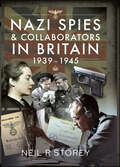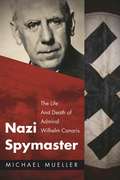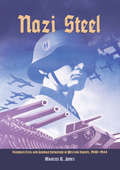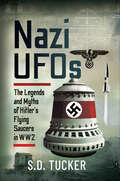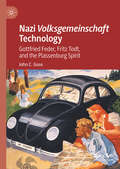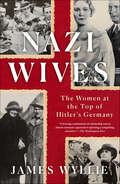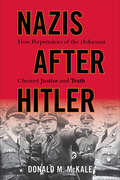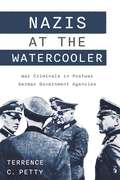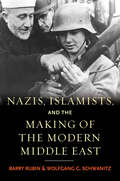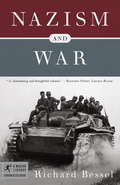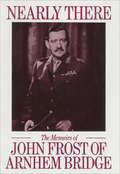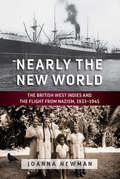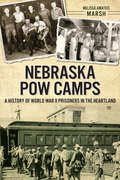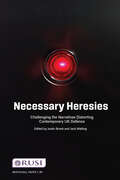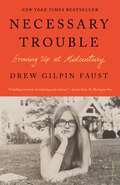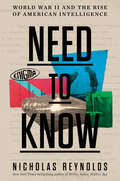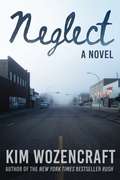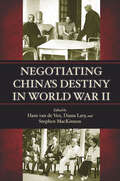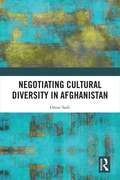- Table View
- List View
Nazi Spies & Collaborators in Britain, 1939–1945
by Neil R. Storey"...reveals the climate of fear along with the identities and case studies of suspected collaborators in key invasion areas." —ARGunners.comThe true extent of Nazi secret agent activity in Britain during the Second World War has received little attention. In large part this is due to the highly classified nature of the subject. This fascinating book uses recently released documents to explore how German agents penetrated our borders and explains methods of agent recruitment. Some spies were arrested and handed over the MI5 for interrogation. Several were turned and became ‘double-cross’ agents, while others were tried and executed or incarcerated in Camp 020 and other facilities. There were also those who came and left undetected and were only revealed after Nazi records were seized. The story, however, does not end there. While British authorities urged the public to beware of spies and posters warned ‘careless talk costs lives,’ the actual existence of Nazi collaborators in Britain was played down. Author Neil R Storey’s discovery of MI5’s and Regional Security Panels’ ‘Black Lists’ of those considered to be ‘likely to assist the enemy’ in the event of invasion reveals the climate of fear along with the identities and case studies of suspected Nazi collaborators in key invasion areas. This book is a gripping exposé of the very real threat posed by Nazi undercover operatives and collaborators in Britain during the Second World War.
Nazi Spymaster: The Life and Death of Admiral Wilhelm Canaris
by Gerhard L. Weinberg Michael MuellerAdmiral Wilhelm Canaris was the head of the Abwehr?Hitler's intelligence service?from 1935 to 1944. Initially a supporter of Hitler, Canaris came to vigorously oppose his policies and practices and worked secretly throughout the war to overthrow the regime. Near the end of the war, secret documents were discovered that implicated Canaris and hinted at the extent of the activities conducted by Canaris's Abwehr against the Hitler regime, and in 1945 Canaris was executed as a national traitor. But Canaris left little in the way of personal documents, and to this day he remains a figure shrouded in mystery. Drawing on newly available archival materials, Mueller investigates the double life of this legendary and enigmatic figure in the first major biography of Canaris to be published in German.
Nazi Steel
by Marcus O. JonesThis study explores an exemplary instance of the close interaction between private and official interests in planning and executing the programs of the Nazi government, namely the acquisition in 1941 of the Rombach steel works by the German industrialist Friedrich Flick. The industrial concern headed by Flick was among the largest and most influential steel producers and manufacturers of war material in the German economy during World War II. Its activities in the occupied territories of western Europe centered on control of the Rombach works, a large operation established in Lorraine in the late nineteenth-century by German industrialists and expropriated by France, along with the entire region, in the aftermath of the First World War. After successful military operations against France in 1940, the Nazi regime actively sought the collusion of the German industrial community in mobilizing the productive capacity of occupied territories for the war effort, and numerous private German businessmen advanced claims on the lucrative assets in Lorraine and adjacent regions. In his bid to gain control of the Rombach works, Flick was successful for reasons specific to his position within the Nazi German economic system and the character of his interests. This account of his activities, then, serves as a fine example of Nazi economic and occupation policy and its response to party, business, and bureaucratic influences.
Nazi UFOs: The Legends and Myths of Hitler's Flying Saucers in WW2
by S.D. TuckerNazi UFOs tells the strange tale of how, following the first alleged flying saucer sightings made in the USA in 1947, a series of fantasists and neo-fascists came forward to create a media myth that the Nazis may have invented these incredible craft as a means for winning the Second World War, a plan which was tantalisingly close to completion before the Allies conquered Berlin in 1945. Today, the fantasy of Nazi UFOs has grown into an entire mythology in books, on TV and online. Did Germany back-engineer anti-gravity craft, and even a full-blown time-machine, by stripping technology from a crashed alien saucer? Did the SS secretly invent ‘Green’ technology for use in their star ship engines, and was this planet-saving discovery later suppressed at the behest of a sinister Big Oil conspiracy? Did Himmler try to develop ‘lightning weapons’ for use in aerial combat? By contrasting the fake military-industrial pseudo-histories of Nazi UFO theorists with details of real-life Nazi aerospace achievements, the author demonstrates both how this modern-day mythology came about and how it cannot possibly be more than fractionally true. For the first time, this fake ‘alternative military history’ is laid out in full. This book features an appealing cast of con-men and spies, complete madmen, real-life Nazis and completely made-up ones, operating right across the globe from South America to wartime Europe and Japan. A good example may be the ‘mad professor’, Viktor Schauberger, who actually genuinely did manage to gain a personal audience with Adolf Hitler in order to try and convince him that he had discovered and then exploited some amazing new source of natural ‘free energy’ which could make objects (such as saucers, in the opinion of some) float. Hitler dismissed his plan, but it does nonetheless show how close some bizarre schemes came to being implemented in Nazi Germany.
Nazi Volksgemeinschaft Technology: Gottfrried Feder, Fritz Todt, and the Plassenburg Spirit
by John C. GuseThis book traces how Gottfried Feder and Fritz Todt made technology essential to the Nazi ‘world view’. They groomed engineers with a racist technical ideology that prepared them to later supervise slave labor and the Holocaust. Their concepts evolved from völkisch technocracy to an idealized harmony of man, machine and nature, and were eclipsed by Albert Speer’s total war. Partially due to willing ‘self-coordination’ from engineers, they gained political control over the engineering profession. Destined to be pillars of the Volksgemeinschaft, engineers were indoctrinated with Nazi principles of Aryan superiority at the Reich School of Technology, the Plassenburg. Nazi propaganda announced a bright future through technology, furthering a sense of normalcy in Germany, despite the ruthless exclusion of those unwanted.
Nazi War Crimes, US Intelligence and Selective Prosecution at Nuremberg: Controversies Regarding the Role of the Office of Strategic Services
by Michael SalterReviewing recently declassified CIA documents, this book provides a balanced but critical discussion of the contribution of American intelligence officials to the Nuremberg war crimes trials. Giving new details of how senior Nazi war criminals, such as SS General Karl Wolff, were provided with effective immunity deals, partly as a reward for their wartime cooperation with US intelligence officials, including Allen Dulles, former CIA Director, the author also discusses the role of such officials in mobilizing the unique resources of a modern intelligence agency to provide important trial testimony and vital documentary evidence. Nazi War Crimes, US Intelligence and Selective Prosecution at Nuremberg argues that both war crimes prosecutors and intelligence officials can engage in mutually beneficial collaborations, but that both sides need to recognize and appreciate the problems that may arise from the fact that these institutions are required to operate according to different, and in some cases contradictory, agendas. This topical book gives those studying, or with interests in, international law, criminal law and history an insight into the debates surrounding international war crimes, within the context of the Nuremberg war crimes trials.
Nazi Wives: The Women at the Top of Hitler's Germany
by James WyllieAn in-depth look at the personal lives, psychological profiles, and marriages of the wives of officers in Hitler’s inner circle: “Compelling.” —The Washington PostGoering, Goebbels, Himmler, Heydrich, Hess, Bormann—names synonymous with power and influence in the Third Reich. Perhaps less familiar are Carin, Emmy, Magda, Margaret, Lina, Ilse, and Gerda.These are the women behind the infamous men—complex individuals with distinctive personalities who were captivated by Hitler and whose everyday lives were governed by Nazi ideology. Throughout the rise and fall of Nazism these women loved and lost, raised families and quarreled with their husbands and each other, all the while jostling for position with the Fuhrer himself. Until now, they have been treated as minor characters, their significance ignored, as if they were unaware of their husbands’ murderous acts, despite the evidence that was all around them: the stolen art on their walls, the slave labor in their homes, and the produce grown in concentration camps on their tables.James Wyllie’s Nazi Wives explores these women in detail for the first time, skillfully interweaving their stories through years of struggle, power, decline, and destruction into the post-war twilight of denial and delusion.“A chilling and richly detailed group portrait of the women who married Third Reich leaders.” —Publishers Weekly
Nazi and Holocaust Representations in Anglo-American Popular Culture, 1945–2020: Irreverent Remembrance (Palgrave Studies in Cultural Heritage and Conflict)
by Jeffrey DemskyThis book analyzes sensationalized Nazi and Holocaust representations in Anglo-American cultural and political discourses. Recognizing that this history is increasingly removed from contemporary life, it explains how irreverent representations can help rejuvenate the story for successive generations of new learners. Surveying seventy-five-years of transatlantic activities, the work erects counterposing categorizes of “constructive and destructive memorializing,” providing scholars with a new framework for elucidating both this history and its historicization.
Nazis after Hitler: How Perpetrators of the Holocaust Cheated Justice and Truth
by Donald M McKaleThe stories of thirty war criminals who escaped accountability, from a historian praised for his &“well written, scrupulously researched&” work (The New York Times). This deeply researched book traces the biographies of thirty &“typical&” perpetrators of the Holocaust—some well-known, some obscure—who survived World War II. Donald M. McKale reveals the shocking reality that the perpetrators were rarely, if ever, tried or punished for their crimes, and nearly all alleged their innocence in Germany&’s extermination of nearly six million European Jews. He highlights the bitter contrasts between the comfortable postwar lives of many war criminals and the enduring suffering of their victims, and how, in the face of exhaustive evidence showing their culpability, nearly all claimed ignorance of what was going on—and insisted they had done nothing wrong. &“McKale ends the book with a haunting question: whether life would be different today if the Allies had pursued Holocaust criminals more aggressively after WWII. History buffs and students of the Holocaust will be fascinated.&” ―Publishers Weekly &“Gripping and important reading.&” —Eric A. Johnson, author of What We Knew
Nazis at the Watercooler: War Criminals in Postwar German Government Agencies
by Terrence PettyAfter World War II, when a new German democracy was born in the western region of the vanquished Third Reich, tens of thousands of civil servants were hired to work for newly formed government agencies to get the new republic quickly on its feet. But there was an enormous flaw in the plan: no serious vetting system was put in place to keep war criminals out of government positions. Ex-Nazis—people who had been involved in mass murder, drafting antisemitic laws, and the persecution of Hitler&’s opponents, as well as other depravities—resumed their careers without consequence in the newly created Federal Republic of Germany. Former Nazis who had established an early foothold in postwar government agencies helped each other get government work by writing letters of recommendation called Persilscheine. These &“Persil Certificates,&” named after a popular detergent, made an ex-Nazi&’s recorded past just as clean as fresh laundry, and a whole generation of German government officials with Nazi pasts was never brought to account. Ex-Nazis were given preference for government jobs even over victims of Nazi policies and anti-Hitler resisters. They swapped Nazi uniforms for suits, Hitler salutes for handshakes. And with help from the highest levels of West German government and even the CIA, they swept their crimes under the carpet and resurrected their careers. Nazis at the Watercooler illuminates the network of ex–Third Reich loyalists and the U.S. government&’s complicity that enabled this mass impunity.
Nazis en las sombras (Historia Incógnita)
by Julio B. MuttiArgentina fue un hervidero de espías nazis durante la Segunda Guerra Mundial. Estaban en todos los estamentos y vinculados estrechamente con las altas esferas luchando por el control estratégico de Sudamérica. La historia de estos espías, sin embargo, no ha sido revelada hasta ahora. “Nazis en las sombras” desvela la historia documentada y nunca antes narrada de las redes de espionaje nazis en Argentina durante la Segunda Guerra Mundial. Su verdadero alcance, tamaño, objetivos y actividades clandestinas. Es sabido que la Argentina fue el último puente con Occidente de la Alemania nazi. Sin embargo, la historia en las sombras de los más de ciento cincuenta espías que apuntalaron aquella situación a permanecido oculta, a medio narrar o simplemente desconocida por más de setenta años. Las presentes páginas harán recorrer al lector la extensa geografía argentina. Desde la sureña Santa Cruz hasta el norte más árido, los alemanes expandieron sus redes de información y estaciones clandestinas de radiotelegrafía. Chacras misteriosas, dobles agentes y desembarcos clandestinos en playas desoladas llevaran el relato a su punto culminante. Las relaciones y pactos secretos de los espías nazis con el poder gobernante de los años cuarenta no pueden ser eludidos. Salvoconductos secretos, utilización de la información de espionaje y hasta acuerdos de alta política entre naciones sudamericanas aparecerán evidenciados en el transcurso de la presente investigación.
Nazis, Islamists, and the Making of the Modern Middle East
by Barry Rubin Wolfgang G. SchwanitzA groundbreaking account of the Nazi-Islamist alliance that changed the course of World War II and influences the Arab world to this day.During the 1930s and 1940s, a unique and lasting political alliance was forged among Third Reich leaders, Arab nationalists, and Muslim religious authorities. From this relationship sprang a series of dramatic events that, despite their profound impact on the course of World War II, remained secret until now. In this groundbreaking book, esteemed Middle East scholars Barry Rubin and Wolfgang G. Schwanitz uncover for the first time the complete story of this dangerous alliance and explore its continuing impact on Arab politics in the twenty-first century.Rubin and Schwanitz reveal, for example, the full scope of Palestinian leader Amin al-Husaini’s support of Hitler’s genocidal plans against European and Middle Eastern Jews. In addition, they expose the extent of Germany’s long-term promotion of Islamism and jihad. Drawing on unprecedented research in European, American, and Middle East archives, many recently opened and never before written about, the authors offer new insight on the intertwined development of Nazism and Islamism and its impact on the modern Middle East.“[Nazis, Islamists] reinsert[s] racial ideology into the study of the desert conflict and thereby offer[s] new insights into the Nazis’ relationships with their North African and Middle Eastern partners.” —Mia Lee, Contemporary European History“Thoroughly researched and closely argued.” —David Pryce-Jones, National Review“The odd-couple marriage between Nazis and Arab nationalists has come under increasingly revealing scrutiny over the last decade. Here, fresh research from previously unexamined archives explicitly ties that frightening nexus to today’s Middle East.”—Gene Santoro, World War II magazine“This book tells a remarkable and–to me at least–little known but very important story.” —Marshall Poe, New Books in History
Nazism and War
by Richard BesselA chilling and powerful account of the rise and fall of the Nazis, emphasising their beliefs in race and war which produced the most terrible killing frenzy in the history of humanityAs this book shows, Nazi ideology was based on two central beliefs: in war and race. Peace was merely a preparation for war, war which would redraw the racial map of Europe. The author begins with the aftermath of the First World War and the corrosive myth-building which substituted memories of senseless slaughter with the myth of a meaningful and even sacred event. It moves on steadily through the 1920s and the Nazi seizure of power, to the economic boom, massive rearmament and government-sponsored anti-Semitism of the 1930s. And then on to the war itself and the Nazis' racist war of extermination.The author pays particular attention to the chaos and extreme violence of the last months of the war, so catastrophic for the German people that they came to believe that they too had been victims of the war. Finally he describes the aftermath of the Second World War and the wreckage left behind by the Nazis which affected the lives of Germans and Europeans far beyond May 1945.
Nazism and War (Modern Library Chronicles #20)
by Richard BesselThe Second World War was the defining event of the twentieth century, leaving millions dead and redrawing the political map in ways that continue to affect nearly the entire human race. What was unprecedented, however, was not simply the war’s scale, but its causes. Unlike previous territorial or political clashes, the war launched by Nazi Germany was an ideological one, waged to wipe entire peoples and cultures from the face of the earth. InNazism and War,Richard Bessel, one of the preeminent authorities on the social and political history of modern Germany, demonstrates how racial hatred was the driving force behind–and not a by-product of–Nazism. War was the anvil on which Hitler’s worldview was forged; to him, war was “the most memorable period of my life,” and “all the past fell away into oblivion. ” German National Socialism was born in war, emerging triumphant over a country deeply scarred by defeat and eager to reclaim its greatness and to punish those who had usurped it. As a political philosophy, Nazism glorified struggle and conflict, viewing them as the purpose of a nation and a measure of its overall condition. As a political movement and state system, Nazism made its ideology real, plunging the European continent into a war of annihilation and a sea of blood. Nazism–inseparable from war–destroyed the old Europe, and thus helped to create the world in which we live. Incisive, authoritative, and immensely readable, this is an incendiary and forcefully argued work of scholarship that will rank with the most influential historical analyses of our time. From the Hardcover edition.
Nearly There: The Memoirs of John Frost of Arnhem Bridge
by Major General John FrostThis is the full autobiography of one of World War II's most popular heroes. Whilst Arnhem was the height of his career here he describes his early life in the Army (in Scotland), his service abroad, his polo matches, his family and, above all, the ever famous actions including the Bruneval Raid and the fighting in North Africa in which he took part.
Nearly the New World: The British West Indies and the Flight from Nazism, 1933–1945
by Joanna NewmanIn the years leading up to the Second World War, increasingly desperate European Jews looked to far-flung destinations such as Barbados, Trinidad, and Jamaica in search of refuge from the horrors of Hitler’s Europe. Nearly the New World tells the extraordinary story of Jewish refugees who overcame persecution and sought safety in the West Indies from the 1930s through the end of the war. At the same time, it gives an unsparing account of the xenophobia and bureaucratic infighting that nearly prevented their rescue—and that helped to seal the fate of countless other European Jews for whom escape was never an option.
Nebraska POW Camps: A History of World War II Prisoners in the Heartland
by Melissa Amateis MarshDuring World War II, thousands of Axis prisoners of war were held throughout Nebraska in base camps that included Fort Robinson, Camp Scottsbluff and Camp Atlanta. Many Nebraskans did not view the POWs as "evil Nazis." To them, they were ordinary men and very human. And while their stay was not entirely free from conflict, many former captives returned to the Cornhusker State to begin new lives after the cessation of hostilities. Drawing on first-person accounts from soldiers, former POWs and Nebraska residents, as well as archival research, Melissa Marsh delves into the neglected history of Nebraska's POW camps.
Necessary Heresies: Challenging the Narratives Distorting Contemporary UK Defence (Whitehall Papers)
by Justin Bronk Jack WatlingDominant narratives about the changing character of warfare and the revolutionary effect of technological advancement lack nuance and can ultimately be detrimental to the development of a defence capability fit for future purpose.
Necessary Secrets
by Barbara PhinneyWarrant Officer Sylvie Mitchell had resolved to put her last top secret military assignment behind her. Then Jon Cahill, her unborn baby's uncle, showed up, demanding answers about his brother's death in the line of fire. Answers that a government oath--and Sylvie's own guilt--wouldn't allow her to give...Jon was as determined to be her child's father figure as he was to learn about the fatal night Sylvie became pregnant. But despite the risk to her secrets, she soon found comfort in the sexy cop's passionate embraces. Would the one man who could chase away Sylvie's demons still want to be a part of her life when the painful truth was revealed?
Necessary Trouble: Growing Up at Midcentury
by Drew Gilpin FaustAN INSTANT NEW YORK TIMES BESTSELLERA memoir of coming of age in a conservative Southern family in postwar America.To grow up in the 1950s was to enter a world of polarized national alliances, nuclear threat, and destabilized social hierarchies. Two world wars and the depression that connected them had unleashed a torrent of expectations and dissatisfactions—not only in global affairs but in American society and Americans’ lives.A privileged white girl in conservative, segregated Virginia was expected to adopt a willful blindness to the inequities of race and the constraints of gender. For Drew Gilpin, the acceptance of both female subordination and racial hierarchy proved intolerable and galvanizing. Urged to become “well adjusted” and to fill the role of a poised young lady that her upbringing imposed, she found resistance was necessary for her survival. During the 1960s, through her love of learning and her active engagement in the civil rights, student, and antiwar movements, Drew forged a path of her own—one that would eventually lead her to become a historian of the very conflicts that were instrumental in shaping the world she grew up in.Culminating in the upheavals of 1968, Necessary Trouble captures a time of rapid change and fierce reaction in one young woman’s life, tracing the transformations and aftershocks that we continue to grapple with today.Includes black-and-white images
Need You Now (Made in Montana)
by Debbi RawlinsThe pastor's daughter...and the bad boy! Melanie Knowles is the Good Girl of Blackfoot Falls-pastor's daughter, teacher, animal shelter volunteer and upstanding member of the community. And Good Girls are never naughty. Ever. But Melanie is in serious trouble...because Lucas Sloan's wicked blue eyes and deliciously hard body could turn this saint into a very satisfied sinner! Lucas just wanted the Safe Haven animal shelter to help out with the Wild Horse Training Program. Getting hot for teacher was not part of the plan. The magnetism between them is intense, fierce and irresistible. But Lucas has secrets-and if Blackfoot Falls ever finds out, his sexy little trysts with the town sweetheart will ruin Melanie's golden reputation forever....
Need to Know: World War II and the Rise of American Intelligence
by Nicholas ReynoldsOne of The New Yorker's "Best Books of the Year" * A Gilder Lehrman Military History Prize Finalist"Authoritative. . . . [Reynolds's] contribution to our understanding of the rise of American intelligence is unparalleled." —Journal of Intelligence History“The most thorough and detailed history available on the origins of U.S. intelligence.” —Michael Morell, former Deputy Director and Acting Director, CIAHistorian and former CIA officer Nicholas Reynolds, the New York Times bestselling author of Writer, Sailor, Soldier, Spy, uncovers the definitive history of American intelligence during World War II, illuminating its key role in securing victory and its astonishing growth from practically nothing at the start of the war. The entire vast, modern American intelligence system—the amalgam of three-letter spy services of many stripes—can be traced back to the dire straits the world faced at the dawn of World War II. Prior to 1940, the United States had no organization to recruit spies and steal secrets or launch covert campaigns against enemies overseas and just a few codebreakers, isolated in windowless vaults. It was only through Winston Churchill’s determination to mobilize the US in the fight against Hitler that the first American spy service was born, built from scratch against the background of the Second World War.In Need to Know, Nicholas Reynolds explores the birth, infancy, and adolescence of modern American intelligence. In this first-ever look across the entirety of the war effort, Reynolds combines little-known history and gripping spy stories to analyze the origins of American codebreakers and spies as well as their contributions to Allied victory, revealing how they laid the foundation for the Cold War—and beyond.
Neglect: A Novel
by Kim WozencraftFrom the bestselling author of Rush comes a redemptive story of a young mother at war on two fronts. From bestselling author Kim Wozencraft comes the story of a young mother at war on two fronts: first as a soldier in Afghanistan and then upon her return to rural Granite County, New York, where one terrible mistake threatens her family and her sanity. Erin Hill enlists in the Army Reserve in an act of desperation. She and her husband have both lost their jobs and their marriage is disintegrating. Assured that the odds of deployment are extremely low, Erin now finds herself on an Army base in the middle of a combat zone, where it&’s sometimes hard to tell who the enemy is—especially when a respected sergeant turns predator. When Erin returns stateside and reunites with her family, her battle for survival truly begins. Flooded with traumatic memories, with no prospects for jobs or treatment for PTSD, her husband involved with a new woman, Erin falls into the bottle head-first. After a nearly fatal night of despair, she is swept up into a vast and indifferent bureaucracy that threatens to take her children from her—forever. Neglect is a profound story of mother love.
Negotiating China's Destiny in World War II
by Stephen R. Mackinnon Hans Van de Ven Diana LaryNegotiating China's Destiny explains how China developed from a country that hardly mattered internationally into the important world power it is today. Before World War II, China had suffered through five wars with European powers as well as American imperial policies resulting in economic, military, and political domination. This shifted dramatically during WWII, when alliances needed to be realigned, resulting in the evolution of China's relationships with the USSR, the U. S. , Britain, France, India, and Japan. Based on key historical archives, memoirs, and periodicals from across East Asia and the West, this book explains how China was able to become one of the Allies with a seat on the Security Council, thus changing the course of its future. Breaking with U. S. -centered analyses which stressed the incompetence of Chinese Nationalist diplomacy, Negotiating China's Destiny makes the first sustained use of the diaries of Chiang Kai-shek (which have only become available in the last few years) and who is revealed as instrumental in asserting China's claims at this pivotal point. Negotiating China's Destiny demonstrates that China's concerns were far broader than previously acknowledged and that despite the country's military weakness, it pursued its policy of enhancing its international stature, recovering control over borderlands it had lost to European imperialism in the nineteenth and early twentieth century, and becoming recognized as an important allied power with determination and success.
Negotiating Cultural Diversity in Afghanistan
by Omar SadrThis book analyses the problematique of governance and administration of cultural diversity within the modern state of Afghanistan and traces patterns of national integration. It explores state construction in twentieth-century Afghanistan and Afghan nationalism, and explains the shifts in the state’s policies and societal responses to different forms of governance of cultural diversity. The book problematizes liberalism, communitarianism, and multiculturalism as approaches to governance of diversity within the nation-state. It suggests that while the western models of multiculturalism have recognized the need to accommodate different cultures, they failed to engage with them through intercultural dialogue. It also elaborates the challenge of intra-group diversity and the problem of accommodating individual choice and freedom while recognising group rights and adoption of multiculturalism. The book develops an alternative approach through synthesising critical multiculturalism and interculturalism as a framework on a democratic and inclusive approach to governance of diversity. A major intervention in understanding a war-torn country through an insider account, this book will be of great interest to scholars and researchers of politics and international relations, especially those concerned with multiculturalism, state-building, nationalism, and liberalism, as well as those in cultural studies, history, Afghanistan studies, South Asian studies, Middle East studies, minority studies, and to policymakers.
